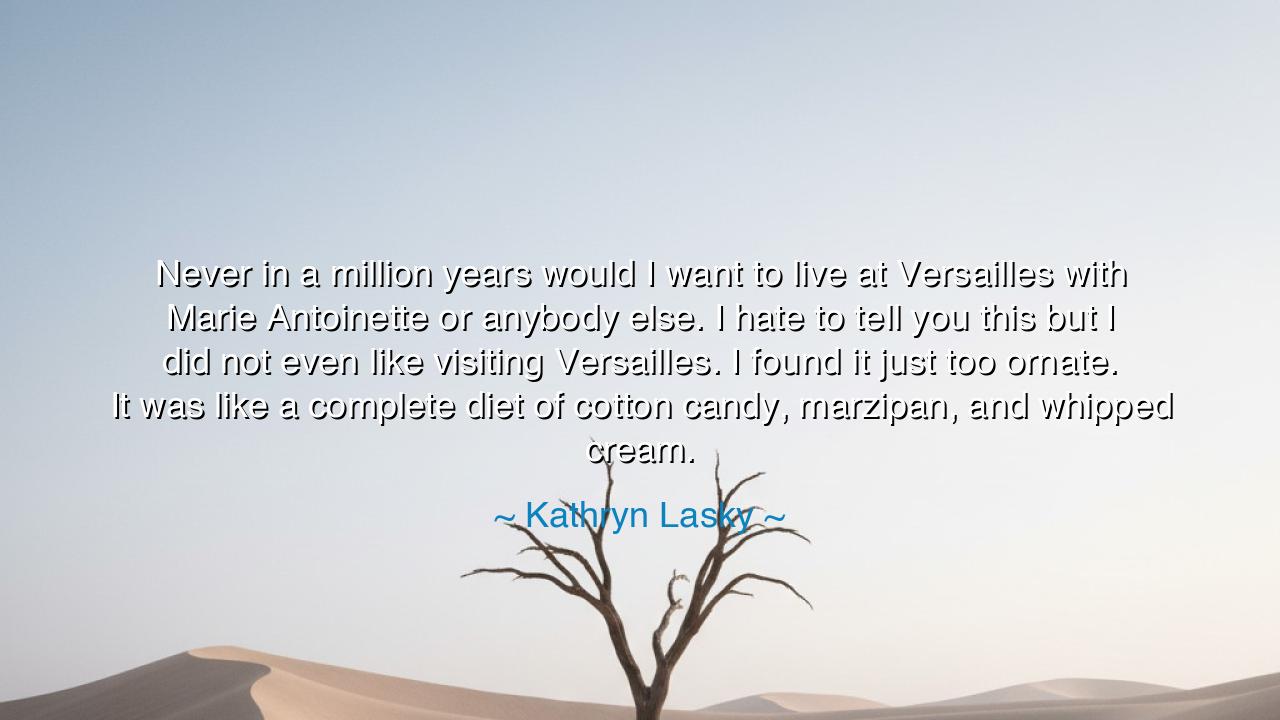
Never in a million years would I want to live at Versailles with
Never in a million years would I want to live at Versailles with Marie Antoinette or anybody else. I hate to tell you this but I did not even like visiting Versailles. I found it just too ornate. It was like a complete diet of cotton candy, marzipan, and whipped cream.






In the vivid and discerning words of Kathryn Lasky, we are reminded of the perils of excess and the hollowness of superficial splendor: “Never in a million years would I want to live at Versailles with Marie Antoinette or anybody else. I hate to tell you this but I did not even like visiting Versailles. I found it just too ornate. It was like a complete diet of cotton candy, marzipan, and whipped cream.” Her imagery, sweet yet suffocating, paints a portrait of beauty turned to burden, of luxury so rich that it loses all nourishment. Beneath her words lies an ancient truth—that abundance without simplicity breeds emptiness, and that a life too decorated often conceals a spirit starved of meaning.
To understand her disdain for Versailles, one must recall what that palace represented: not merely a home, but the ultimate monument to human vanity. Built by Louis XIV, the Sun King, it was meant to reflect the divine majesty of his reign. Gold dripped from every wall, crystal chandeliers burned through nights of endless feasting, and fountains sang in the gardens like instruments of heaven. Yet beneath the brilliance of marble and mirror, there festered decay—moral, political, and human. The peasants starved while the court bathed in perfume. When Marie Antoinette ascended to her role, she inherited not just a palace, but a symbol of disconnection—the shimmering bubble of a world that had forgotten the pulse of real life.
Lasky’s rejection of this grandeur reveals a timeless wisdom: that ornament without substance is no true beauty. To her, Versailles was not majestic—it was cloying, like “a diet of cotton candy, marzipan, and whipped cream.” The sweetness of her metaphor is deliberate: for what delights the senses for a moment soon nauseates the soul if consumed too often. Just as too much sugar dulls the tongue and weakens the body, too much luxury dulls the heart and weakens the spirit. True nourishment—whether in food, art, or life—requires balance. The ancients knew this well. Aristotle spoke of the Golden Mean, the virtue of moderation between excess and deficiency. Lasky’s words echo his teaching: that to live fully, one must resist both poverty of means and gluttony of pleasure.
Indeed, history is replete with examples of those who drowned in their own decadence. Versailles itself became the stage for such a downfall. While the court held masquerades under painted ceilings, the people of France cried out for bread. The “diet of cotton candy” was not only a metaphor—it was a reality, for the ruling class consumed pleasure while the nation starved. And so the sweetness turned bitter; the laughter of banquets was silenced by the roar of revolution. Marie Antoinette’s fate, tragic yet inevitable, stands as a warning to all generations: that when a life—or a society—feeds only on delight and neglects truth, it will collapse under the weight of its own emptiness.
But there is another layer to Lasky’s insight—a personal one. In saying she “did not even like visiting” Versailles, she speaks for all who have learned that grandeur is not peace, and that simplicity is often the higher art. The sage who sits beneath an olive tree, the poet who lives with little but feels much, the traveler who finds beauty in the plain—these are the ones who live richly, not those surrounded by gold. The ancients called this virtue sophrosyne—the wisdom of moderation, the grace of self-restraint. It is not found in palaces, but in hearts that know enough is enough.
Consider Diogenes, the philosopher who lived in a barrel and laughed at the king. When Alexander the Great offered him any favor he desired, Diogenes replied, “Yes—stand out of my sunlight.” He understood that no palace, no silk, no banquet could give him what the sun already gave freely: light, warmth, and contentment. In Lasky’s rejection of Versailles, we hear an echo of Diogenes’ spirit. She sees in its walls not freedom, but oppression disguised as beauty—a gilded prison where humanity is smothered beneath luxury. Her wisdom is not bitterness, but clarity: she knows that life’s sweetest pleasures are those born of authenticity, not artifice.
The lesson, then, is clear and enduring: choose nourishment over decoration. In a world that often dazzles with excess, resist the temptation to mistake glitter for gold. Seek the kind of beauty that feeds the soul—the beauty of sincerity, balance, and purpose. Let your life be a feast not of sugar, but of substance; not of endless sweetness, but of honest flavor. Simplify your surroundings, your habits, your desires, until what remains is genuine. For as the ancients taught, the richest life is not the one most adorned, but the one most aligned—where the heart, the mind, and the world move in quiet harmony.
So, when you stand before the mirror halls of your own ambitions, remember the words of Kathryn Lasky. Ask yourself: is this life nourishing me, or only dazzling me? For in the end, the truest elegance is not found in Versailles, but in the stillness of a heart that no longer hungers for excess—a heart that has learned the eternal art of being full with little.






AAdministratorAdministrator
Welcome, honored guests. Please leave a comment, we will respond soon